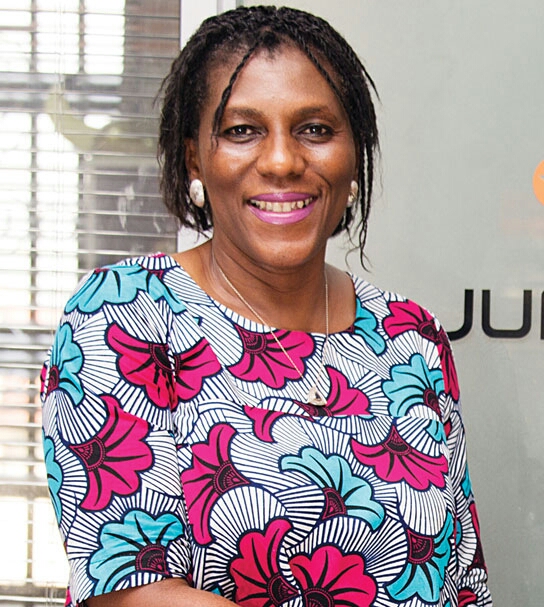E-Financial
Jumia Commends Framework For eCommerce Regulation in Nigeria

Mrs Juliet Anammah, Chief Executive Officer of Jumia Nigeria has described the recent tripartite motion by the Consumer Protection Council (CPC), the Standard Organisation of Nigeria (SON), and the Nigeria Custom Service (NCS) on the urgent need for government to develop a framework to regulate the activities of eCommerce platforms in Nigeria, as a round peg in a round hole.
She assured the government that Jumia will continue to offer necessary supports to ensure such framework is developed with the purpose of protecting unsuspecting shoppers online.
Anammah who made the disclosure in an interview with the Lagos studio of the China Global Television Network (CGTN), said: “we’re committed to helping government agencies understand how ecommerce operates.
“Even though it’s a section of retail, it is still a sub-sector of the total retail market. Because it is digital, there are some differentiations; we’re committed to helping government understand how that operates, how it has advanced in other countries, and what is coming ahead, because regulation isn’t just about constricting, it’s about supporting.”
“So the government wants to support it so it can grow in a way that is positive for the economy and the consumers.
“We share a lot of information, we’ve had sessions with CPC, we have an ongoing collaboration with SON, and many other agencies just to make sure we are constantly giving as much information as possible to assist them in shaping the right policies for the industry.
“In some respects also, we have participated where there are some legal frameworks to give our opinion on what we think based on what we see happen in other global environments relevant to ecommerce and Nigeria.
We give recommendations and engage one-to-one with relevant agencies,” she added.
The motion to develop a framework for regulating eCommerce in Nigeria was moved at a stakeholders’ forum in Lagos, with the theme: “The Role of Standards and Quality Regulation in Electronic Commerce,” organised by the Standard Organisation of Nigeria (SON).
“The need for a regulatory framework was borne from the need to improve the level of customers’ trust, and ensure quality for the money spent in the sub-sector,” said, the Director-General of SON, Chief Osita Aboloma.
It is worthy to mention that Nigeria is not the only country contemplating putting in place a framework for regulating the over US$13 billion worth industry.
The government of India, for instance, is planning to bring in an e-commerce law and a sector regulator to effectively deal with all aspects of online retail.
Some of the key provisions of the draft policy include: large eCommerce firms should phase out discounts within two years; eCommerce companies have to store consumer data within India; independent eCommerce regulator will deal with consumer complaints, compliance with FDI caps; and tax incentives for data localization and infrastructure status for data centres.
Although some of the salient features of the India ecommerce regulatory framework might not be directly applicable to Nigeria, it is expected that the government agencies vested with the responsibility of developing this framework should review countries with existing regulatory framework and rely on the recommendations of local eCommerce operators, such as Jumia.
E-Financial
TCL Launches ‘vetandpay’ to Combat Online Transaction Fraud

Tradewyse Concepts Limited (TCL), Nigeria-based technology solution provider has launched a product called “vetandpay” to address the issues of trust and fraud in online business transactions in the country.

Dr Kalu Ibe, founder and chief executive officer, Tradewyse Concepts Limited
Dr Kalu Ibe, founder and chief executive officer, Tradewyse Concepts Limited, stated that the software was proudly developed by a team of Nigerians.
Speaking at the product dedication ceremony in Abuja, Ibe explained that the app aims to reduce corruption by restoring trust and integrity. He added that it would inspire confidence in both business and the broader transactional environment in Nigeria.
“Today, I present vetandpay.ng, powered by Vetandpay Technologies Ltd, Africa’s foremost escrow company, a subsidiary of TCL,” Ibe said.
“What started as a spark two years ago is now shining brightly over Nigeria’s transactional space, bringing healing with its rays.”
He outlined the various escrow services offered, including auto purchase escrow, procurement escrow, service-based escrow, e-commerce escrow, and property escrow, with more services expected to be added.
Ibe emphasised that the service is available to Nigerians both at home and abroad, promising zero losses in all business transactions when using vetandpay.
Through its Corporate Social Responsibility (CSR) programme, TCL plans to initiate a comprehensive tech training programme for teenagers in Nigerian schools. Ibe highlighted that the initiative aims to equip young people with technological skills, preparing them to enter the digital economy and drive innovation.
Ntufam Ugbo, project director, commented that vetandpay is transforming the business landscape in Nigeria by building trust between buyers and sellers.
“What vetandpay does is act as a middleman between the buyer and the seller,” she said.
Mrs Rachel Samuel, head of Customer Service at vetandpay, described the platform as a secure payment solution designed to eliminate fraud in online transactions.
“Our basic goal is to address the issue of receiving something different from what was ordered,” she explained.
Referring to a report by the Federal Trade Commission, Samuel pointed out that consumers lost over 8.8 billion dollars to fraud in 2022, a 30 per cent increase from the previous year. She noted that with vetandpay, both parties to a business transaction could have peace of mind and zero losses.
She encouraged Nigerians to embrace the services provided by the platform by downloading the vetandpay app and using the technology to secure their transactions.
‘‘Today marks the beginning of a new era in secure online transactions. Whether you are a business owner, freelancer, or everyday buyer, vetandpay is here to protect your hard-earned money,” Samuel concluded.
E-Financial
FG Asks World Bank for Fresh $10.50m Loan to Enhance CBN Technical Capacity

Nigeria has approached the World Bank for a fresh $10.50m loan to enhance the Central Bank of Nigeria’s (CBN) technical capacity and modernise the country’s domestic payment infrastructure.

Olayemi Cardoso, Governor, Central Bank of Nigeria
According to information on the World Bank website on Thursday, the proposed CBN Technical Assistance Facility seeks to support integrating innovative technologies and data science into the CBN’s supervisory processes.
This is expected to help the apex bank tackle long-standing and emerging challenges in Nigeria’s rapidly evolving financial landscape while improving the domestic payment infrastructure for remittances.
The project, currently at the concept review stage, will focus on three key areas. Firstly, it aims to strengthen the CBN’s institutional capacity to keep pace with technological advancements through a robust governance framework, expert advisory support, peer-to-peer central bank exchanges, and modernisation of the CBN’s internal processes to align with the digital era.
Secondly, it will enhance the CBN’s supervisory capacity through technology and data improvements. This involves funding modern technical solutions, including Supervisory Technology systems, to improve data accuracy, operational efficiency, and risk-based supervision.
Thirdly, it aims to modernise domestic payment systems for remittances to improve their safety and reliability.
It will explore innovative methods to attract informal remittance flows into formal channels while conducting annual surveys on remittance households and fostering peer-to-peer learning for knowledge exchange.
According to the World Bank, the objective of this project is “to strengthen technology-enabled, data-driven, risk-based supervision at the CBN and improve domestic payment infrastructure for remittances in Nigeria.”
The project aligns with the government’s pursuit of a cashless economy and the increasing adoption of digital financial services in Nigeria.
The scheme, which has a commitment amount of $10.50m, is scheduled for board presentation approval on June 12, 2025. The implementing agency is the Central Bank of Nigeria.
E-Financial
Sterling Bank Makes Online Transfer Charges Free of Charge

Sterling Bank has called for the cancellation of bank transfer fees by major banks, announcing it will no longer take any money for itself for any local online transactions by its customers.

The announcement, made on April 1st, initially sparked widespread arguments, with many assuming it was a marketing prank tied to April Fools’ Day.
However, Sterling Bank, in a statement, has confirmed that it is not a stunt, that the zero-transfer-fee policy was real, and effective immediately.
With this move, Sterling becomes the first major Nigerian bank to take a definitive stand against the long-standing practice of charging customers for everyday digital transfers, an issue that has grown increasingly contentious as digital banking adoption deepens.
“We believe access to your own money shouldn’t come with a penalty,” said Obinna Ukachukwu, growth executive leading the Consumer and Business Banking Directorate, Sterling Bank
“This is more than a financial decision, it’s a values-based one. It reflects our commitment to making banking fair, inclusive, and truly customer focused.
“We’re not yet the biggest bank in Nigeria, but we’ve been the boldest,” Ukachukwu added.
“Sterling fearlessly believes in the future of Nigeria, and this is us backing Nigerians with more than words,” it sated.
Under the new policy, Sterling customers will enjoy free transfers for all local transactions conducted via the bank’s mobile app. This translates into significant savings, particularly for individuals and new small business owners who make frequent daily transfers.
The bank’s latest move has been met with widespread public approval, sparking positive reactions across social media and placing pressure on industry peers to follow suit.
We’re proud to lead this change,” Ukachukwu added. “We hope it inspires others to think differently about what customers truly need from their banks, not just in services, but in values.”

 General News2 days ago
General News2 days agoAirbnb Community Fund Donates ₦13 Billion to Nonprofits Worldwide

 General News2 days ago
General News2 days agoNigerian Military Makes History with Africa’s First Attack Drones, Bombs

 News2 days ago
News2 days agoShell, Renaissance Face Legal Action over SPDC Licence Transfer

 E-Business2 days ago
E-Business2 days agoKike, Nigerian Tech Firm Launches ‘Kike AI’ for Kitchen Innovation

 Telecom2 days ago
Telecom2 days agoNigeria Heads Anglophone Data Protection Committee

 News2 days ago
News2 days agoWorld Bank Approves $1.08Bn Loan for Nigeria

 Telecom2 days ago
Telecom2 days agoHow MIP Is Making a Difference in The Media Landscape

 E-Financial2 days ago
E-Financial2 days agoSterling Bank Makes Online Transfer Charges Free of Charge

























